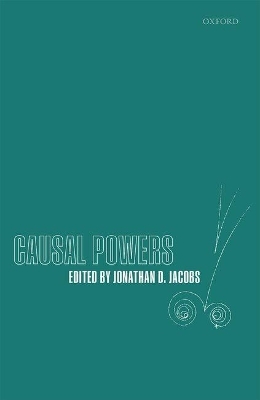
Causal Powers
Seiten
2017
Oxford University Press (Verlag)
978-0-19-879657-2 (ISBN)
Oxford University Press (Verlag)
978-0-19-879657-2 (ISBN)
We use concepts of causal powers and their relatives-dispositions, capacities, and abilities-to describe the world around us, both in everyday life and in scientific practice. This volume presents new work on the nature of causal powers, and their connections with other phenomena within metaphysics, philosophy of science, and philosophy of mind.
Causal powers are ubiquitous. Electrons are negatively charged; they have the power to repel other electrons. Water is a solvent; it has the power to dissolve salt. We use concepts of causal powers and their relatives-dispositions, capacities, abilities, and so on-to describe the world around us, both in everyday life and in scientific practice. But what is it about the world that makes such descriptions apt?
On one view, the neo-Humean view, there is nothing intrinsic about, say, negative charge, that makes its bearers have the power to repel other negatively charged particles. Rather, matters extrinsic to negative charge, the patterns and regularities in which negatively charged particles are embedded, fix the powers its bearers have. But on a different view, the anti-Humean view, causal powers are intrinsically powerful, bringing with them their own causal, nomic, and modal nature independent of extrinsic patterns and regularities-even fixing those patterns and regularities.
This collection brings together new and important work by both emerging scholars and those who helped shape the field on the nature of causal powers, and the connections between causal powers and other phenomena within metaphysics, philosophy of science, and philosophy of mind. Contributors discuss how one who takes causal powers to be in some sense irreducible should think about laws of nature, scientific practice, causation, modality, space and time, persistence, and the metaphysics of mind.
Causal powers are ubiquitous. Electrons are negatively charged; they have the power to repel other electrons. Water is a solvent; it has the power to dissolve salt. We use concepts of causal powers and their relatives-dispositions, capacities, abilities, and so on-to describe the world around us, both in everyday life and in scientific practice. But what is it about the world that makes such descriptions apt?
On one view, the neo-Humean view, there is nothing intrinsic about, say, negative charge, that makes its bearers have the power to repel other negatively charged particles. Rather, matters extrinsic to negative charge, the patterns and regularities in which negatively charged particles are embedded, fix the powers its bearers have. But on a different view, the anti-Humean view, causal powers are intrinsically powerful, bringing with them their own causal, nomic, and modal nature independent of extrinsic patterns and regularities-even fixing those patterns and regularities.
This collection brings together new and important work by both emerging scholars and those who helped shape the field on the nature of causal powers, and the connections between causal powers and other phenomena within metaphysics, philosophy of science, and philosophy of mind. Contributors discuss how one who takes causal powers to be in some sense irreducible should think about laws of nature, scientific practice, causation, modality, space and time, persistence, and the metaphysics of mind.
Jonathan D. Jacobs is Associate Professor of Philosophy at Saint Louis University. His work is primarily in metaphysics (focused on causal powers and their connection with causation, laws of nature, modality, and free will) and philosophy of religion. He has published articles in Philosophical Quarterly, Philosophical Studies, and The Monist, among other places.
PART 1. SCIENCE AND LAWS OF NATURE; PART 2. CAUSATION AND MODALITY; PART 3. SPACE, TIME, AND PERSISTENCE; PART 4. MIND
| Erscheinungsdatum | 23.06.2017 |
|---|---|
| Verlagsort | Oxford |
| Sprache | englisch |
| Maße | 163 x 240 mm |
| Gewicht | 552 g |
| Themenwelt | Geisteswissenschaften ► Philosophie ► Metaphysik / Ontologie |
| Naturwissenschaften | |
| ISBN-10 | 0-19-879657-9 / 0198796579 |
| ISBN-13 | 978-0-19-879657-2 / 9780198796572 |
| Zustand | Neuware |
| Haben Sie eine Frage zum Produkt? |
Mehr entdecken
aus dem Bereich
aus dem Bereich
Buch | Hardcover (2024)
Matthes & Seitz (Verlag)
CHF 41,90
Über konstruktivistisches Denken in der Theologie
Buch | Softcover (2024)
Verlag Herder
CHF 79,95


